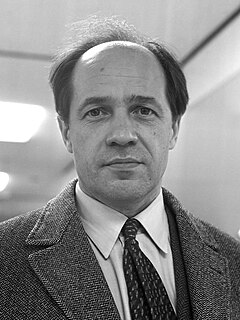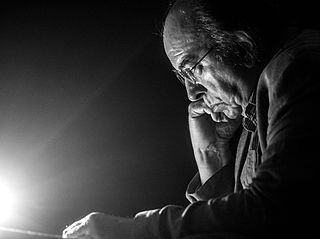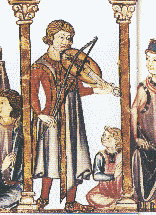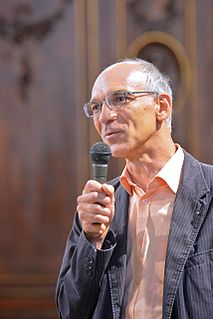 W
WJean-Baptiste le Rond d'Alembert was a French mathematician, mechanician, physicist, philosopher, and music theorist. Until 1759 he was, together with Denis Diderot, a co-editor of the Encyclopédie. D'Alembert's formula for obtaining solutions to the wave equation is named after him. The wave equation is sometimes referred to as d'Alembert's equation, and the Fundamental theorem of algebra is named after d'Alembert in French.
 W
WJuliette Nadia Boulanger was a French composer, conductor, and teacher. She is notable for having taught many of the leading composers and musicians of the 20th century. She also performed occasionally as a pianist and organist.
 W
WPierre Louis Joseph Boulez CBE was a French composer, conductor, writer and founder of several musical institutions. He was one of the dominant figures of the post-war classical music world.
 W
WLoys "Louis" Bourgeois was a French composer and music theorist of the Renaissance. He is most famous as one of the main compilers of Calvinist hymn tunes in the middle of the 16th century. One of the most famous melodies in all of Christendom, the Protestant doxology known as the Old 100th, is commonly attributed to him.
 W
WSébastien de Brossard, pronounced [se.bɑs.tjẽ də brɔ.saːr], was a French music theorist, composer and collector.
 W
WCharles-Simon Catel was a French composer and educator born at L'Aigle, Orne.
 W
WSalomon de Caus was a French Huguenot engineer, once (falsely) credited with the development of the steam engine.
 W
WMichel-Paul Guy de Chabanon was a violinist, composer, music theorist, and connoisseur of French literature. He was elected to the Académie des inscriptions et belles-lettres (1760) and the Académie française (1779).
 W
WÉmile-Joseph-Maurice Chevé was a French music theorist and music teacher.
 W
WAlexandre-Étienne Choron was a French musicologist. For a short time he directed the Paris Opera. He made a distinction between sacred and secular music and was one of the originators of French interest in musicology.
 W
WGuillaume Costeley [pronounced Cotelay](1530, possibly 1531 – 28 January 1606) was a French composer of the Renaissance. He was the court organist to Charles IX of France and famous for his numerous chansons, which were representative of the late development of the form; his work in this regard was part of the early development of the style known as musique mesurée. He was also one of very few 16th century French composers of music for keyboard. In addition, he was a founding member of the Académie de Poésie et de Musique along with poet Jean-Antoine de Baïf, and he was one of the earliest composers to experiment with microtonal composition.
 W
WRené Descartes was a French-born philosopher, mathematician, and scientist. A native of the Kingdom of France, he spent about 20 years (1629–1649) of his life in the Dutch Republic after serving for a while in the Dutch States Army of Maurice of Nassau, Prince of Orange and the Stadtholder of the United Provinces. One of the most notable intellectual figures of the Dutch Golden Age, Descartes is also widely regarded as one of the founders of modern philosophy.
 W
WFrançois-Clément Théodore Dubois was a French composer, organist, and music teacher.
 W
WÉmile Durand was a French musical theorist, teacher and composer. He was better known for his theoretical writings than for his compositions.
 W
WJean-Claude Éloy is a French composer of instrumental, vocal and electroacoustic music.
 W
WAndré Gedalge was an influential French composer and teacher.
 W
WJohannes de Grocheio was a Parisian musical theorist of the early fourteenth century. His French name was Jean de Grouchy, but he is more commonly known by his Latinized name. He is most well-known as the author of the treatise Ars musicae, which describes the practice of sacred and secular music in and around Paris during his lifetime.
 W
WPaul Marie Théodore Vincent d'Indy was a French composer and teacher.
 W
WHonoré François Marie Langlé (1741–1807) was a French theorist of music of Monegasque origin, composer, and author of a Traité d'harmonie et de modulation. Napoleon named him to the newly founded Paris Conservatoire.
 W
WChristophe Looten is a French composer. Born in Bergues, he was made Chevalier des Arts et des Lettres in January 2000.
 W
WMarin Mersenne was a French polymath, whose works touched a wide variety of fields. He is perhaps best known today among mathematicians for Mersenne prime numbers, those which can be written in the form Mn = 2n − 1 for some integer n. He also developed Mersenne's laws, which describe the harmonics of a vibrating string, and his seminal work on music theory, Harmonie universelle, for which he is referred to as the "father of acoustics". Mersenne, an ordained Catholic priest, had many contacts in the scientific world and has been called "the center of the world of science and mathematics during the first half of the 1600s" and, because of his ability to make connections between people and ideas, "the post-box of Europe". He was also a member of the Minim religious order and wrote and lectured on theology and philosophy.
 W
WJean-Paul C. Montagnier is a French musicologist. He studied at the Conservatoire National Supérieur de Musique de Paris, where he received two first prizes in musical analysis and music history, before completing a PhD at Duke University (1994). He is currently Professor of musicology at the University of Lorraine, and Associate Member of the Institut de Recherche en Musicologie (CNRS). He also was Adjunct Professor at McGill University. He was involved with Musica Gallica, an edition of the works of the musical patrimony of France. He serves on the editorial board of the Collected Works of Jean-Baptiste Lully published by Olms (Germany). He was made Officer in the Order of Arts and Letters by the French Government in 2012. He was nominated to become a Robert M. Trotter Visiting Distinguished Professor at the University of Oregon School of Music and Dance during the 2018–2019 academic year.
 W
WAndré Gabriel Edmée Pirro was a French musicologist and an organist.
 W
WJean-Philippe Rameau was one of the most important French composers and music theorists of the 18th century. He replaced Jean-Baptiste Lully as the dominant composer of French opera and is also considered the leading French composer of his time for the harpsichord, alongside François Couperin.
 W
WNapoléon Henri Reber was a French composer.
 W
WAnton Joseph Reicha (Rejcha) was a Czech-born, Bavarian-educated, later naturalized French composer and music theorist. A contemporary and lifelong friend of Beethoven, he is now best remembered for his substantial early contributions to the wind quintet literature and his role as teacher of pupils including Franz Liszt, Hector Berlioz and César Franck. He was also an accomplished theorist, and wrote several treatises on various aspects of composition. Some of his theoretical work dealt with experimental methods of composition, which he applied in a variety of works such as fugues and études for piano and string quartet.
 W
WPierre Henri Marie Schaeffer was a French composer, writer, broadcaster, engineer, musicologist and acoustician. His innovative work in both the sciences—particularly communications and acoustics—and the various arts of music, literature and radio presentation after the end of World War II, as well as his anti-nuclear activism and cultural criticism garnered him widespread recognition in his lifetime.
 W
WPhilippe de Vitry was a French composer, music theorist and poet. He was an accomplished, innovative, and influential composer, and may also have been the author of the Ars Nova treatise. He was widely acknowledged as the greatest musician of his day, with Petrarch writing a glowing tribute, calling him: "... the keenest and most ardent seeker of truth, so great a philosopher of our age."